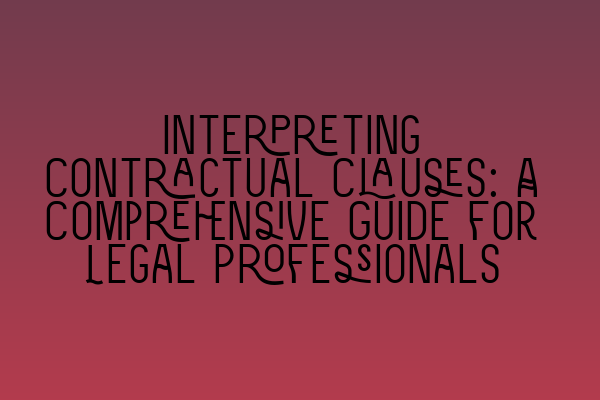Interpreting Contractual Clauses: A Comprehensive Guide for Legal Professionals
Welcome to our comprehensive guide on interpreting contractual clauses. As legal professionals, it is essential to have a thorough understanding of how to interpret and analyze the various clauses within a contract. This guide will provide you with valuable insights and practical tips to navigate through the complexities of contractual interpretation.
Why is Contractual Interpretation Important?
Contractual interpretation is vital as it determines the rights and obligations of the parties involved in a contract. Proper interpretation ensures that all parties are on the same page and that potential disputes are minimized. It helps avoid misunderstandings and potential litigation, safeguarding the interests of your clients.
Now, let’s dive into the key aspects to consider when interpreting contractual clauses:
1. Language and Context
The language used in a contract is crucial. Each word and phrase should be carefully examined to determine its intended meaning. Consider the context in which the clause is written to understand its purpose and scope.
For example, if a contract includes a clause stating that “the buyer shall provide suitable transportation,” the interpretation may vary based on the context. What is considered “suitable transportation” would depend on the nature of the agreement, the industry involved, and the expectations of the parties.
By analyzing the language and context, you can identify any potential ambiguities or conflicts within the contractual language.
2. Purpose and Intention
Understanding the purpose and intention behind a contractual clause is critical in interpreting its meaning. Look for any indications within the contract or the surrounding circumstances that provide insight into what the parties intended.
Consider whether the clauses are drafted broadly or specifically. Broad clauses may indicate a more general intention, while specific clauses may demonstrate a more specific purpose. By understanding the purpose and intention, you can interpret the clause in a manner that aligns with the parties’ objectives.
3. Commercial Common Sense
Interpretation should also take into account commercial common sense. Ask yourself: What would a reasonable person understand from the language used in the context of the contract? Avoid interpreting clauses in a way that leads to commercially absurd or nonsensical results.
Commercial common sense often guides the interpretation of contractual clauses, as it helps align the contract with the reality of the parties’ business and commercial goals.
4. Trade Customs, Practices, and Industry Standards
Consider any trade customs, practices, or industry standards that may inform the interpretation of a relevant clause. Industry-specific terms, practices, or standards may have an impact on how certain clauses are understood.
For instance, if you are interpreting a clause in a construction contract, it would be essential to consider industry standards for project completion timelines or specifications.
5. Previous Dealings and Course of Performance
When interpreting a contractual clause, it can be helpful to review the parties’ previous dealings or the course of performance under the contract. These can provide insights into how the parties have interpreted and performed similar clauses in the past.
Previous dealings and course of performance can help establish a common understanding between the parties and enable a more accurate interpretation of ambiguous or unclear clauses.
Conclusion
Interpreting contractual clauses requires a meticulous analysis of the language, context, purpose, and intention of the contract. Additionally, considering commercial common sense, trade customs, and past dealings can enhance the interpretation process.
By carefully interpreting contractual clauses, you can provide your clients with valuable guidance, minimize potential disputes, and uphold the integrity of their contractual relationships.
We hope this comprehensive guide has equipped you with the tools and knowledge to effectively interpret contractual clauses. For more information on SQE training and exam preparation, check out our related articles:
- SQE Sample Papers: Practice for Exam Success
- Adjusting Your SQE Strategy Based on Mock Performance
- Peer Discussions Post-Mock: Learning from Collaboration and Feedback
- Adjusting Strategy Based on Mock Performance: Improving Your Approach
- Strengthening Weak Areas in SQE: Targeted Practice for Improvement
